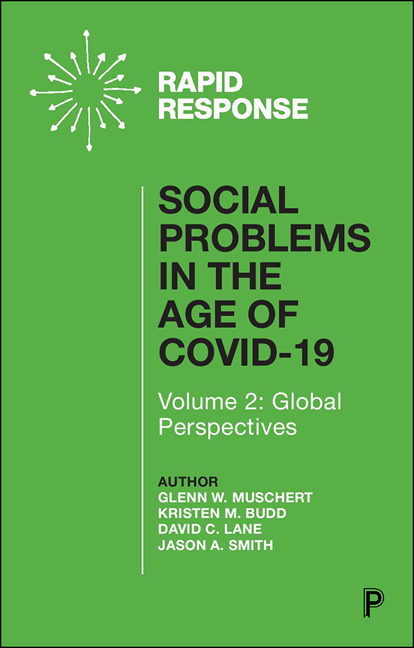Book contents
- Frontmatter
- Contents
- Acknowledgments
- Presidential Welcome
- Editorial Introduction
- 1 Isolation, Economic Desperation, and Exploitation: Human Trafficking and the COVID-19 Crisis
- 2 Uncertainty and Disruption in the Transition to Adulthood During COVID-19
- 3 Disability Rights and Healthcare Rationing during COVID-19
- 4 Social-Distancing the Settler-State: Indigenous Peoples in the Age of COVID-19
- 5 The Pandemic and the Invisible Poor of the Global South: Slum Dwellers in Mumbai, India and Dhaka, Bangladesh
- 6 The Human Right to Water and Sanitation in the Age of COVID-19
- 7 Pandemic Perils of Migrant Workers: Inequalities Intensified
- 8 Food Insecurity and COVID-19
- 9 Protecting Refugee Health and Human Rights in the Context of the COVID-19 Pandemic: Challenges and Pathways to Justice
- 10 COVID-19 Requires an Intersectional Feminist Policy Response
- End Matter
- Afterword
- Index
4 - Social-Distancing the Settler-State: Indigenous Peoples in the Age of COVID-19
Published online by Cambridge University Press: 23 March 2021
- Frontmatter
- Contents
- Acknowledgments
- Presidential Welcome
- Editorial Introduction
- 1 Isolation, Economic Desperation, and Exploitation: Human Trafficking and the COVID-19 Crisis
- 2 Uncertainty and Disruption in the Transition to Adulthood During COVID-19
- 3 Disability Rights and Healthcare Rationing during COVID-19
- 4 Social-Distancing the Settler-State: Indigenous Peoples in the Age of COVID-19
- 5 The Pandemic and the Invisible Poor of the Global South: Slum Dwellers in Mumbai, India and Dhaka, Bangladesh
- 6 The Human Right to Water and Sanitation in the Age of COVID-19
- 7 Pandemic Perils of Migrant Workers: Inequalities Intensified
- 8 Food Insecurity and COVID-19
- 9 Protecting Refugee Health and Human Rights in the Context of the COVID-19 Pandemic: Challenges and Pathways to Justice
- 10 COVID-19 Requires an Intersectional Feminist Policy Response
- End Matter
- Afterword
- Index
Summary
The Problem
The global spread of COVID-19 is quickly exacerbating existing racial and economic disparities, and in its wake, revealing the spatial dynamics of health and interlocking social inequalities that burden marginalized communities. Among Indigenous Peoples, increased risk of exposure is linked to the enduring settler-colonial logics of Indigenous elimination and present-day mistreatment of tribal communities by settler-states that occupy their lands. Specifically, Indigenous communities face social problems such as access to quality, affordable healthcare, sustainable public infrastructure, opportunities for economic self-sufficiency, nutritious food, and clean water. Relatedly, Indigenous cultures and languages are often stigmatized and othered, which may dissuade some Indigenous Peoples from seeking out medical and social services when in need.
Indigenous Peoples are collectively identified as those communities that lived on and cared for a particular land base before the arrival of foreign settlers, inhabitants that routinely threatened Indigenous communities with death, disease, and destruction. Despite those efforts, there are upwards of 400–500 million Indigenous Peoples living around the world today. These communities nourish distinct languages, cultural perspectives, legal systems, and actively resist threats to their knowledge systems from settler societies. In 2020, COVID-19 amplified these threats across the globe. In the Americas, for example, 40 percent of Indigenous Peoples do not have access to conventional healthcare (Cevallos and Amores, 2009) and 73 percent of Canada's First Nations’ water systems are at risk of contamination (Council of Canadians, 2020). Recent reports from Brazil show that predatory resource extraction (timber, water, mining) in Indigenous territories persists during the pandemic, compounding local risk of exposure. Ongoing, comprehensive, and disaggregated data on the rate and effects of COVID-19 infections are urgently needed to combat these ongoing threats. Universal solutions to protect and support Indigenous communities, however, cannot be fully realized without sufficient attention to the social and historical context of settler colonialism. In many cases, current evidence suggests that Indigenous Peoples, and the future safety of tribal communities, may be best served by maintaining social and physical distance from the settler-state.
- Type
- Chapter
- Information
- Social Problems in the Age of COVID-19 Vol 2Volume 2: Global Perspectives, pp. 39 - 50Publisher: Bristol University PressPrint publication year: 2020

